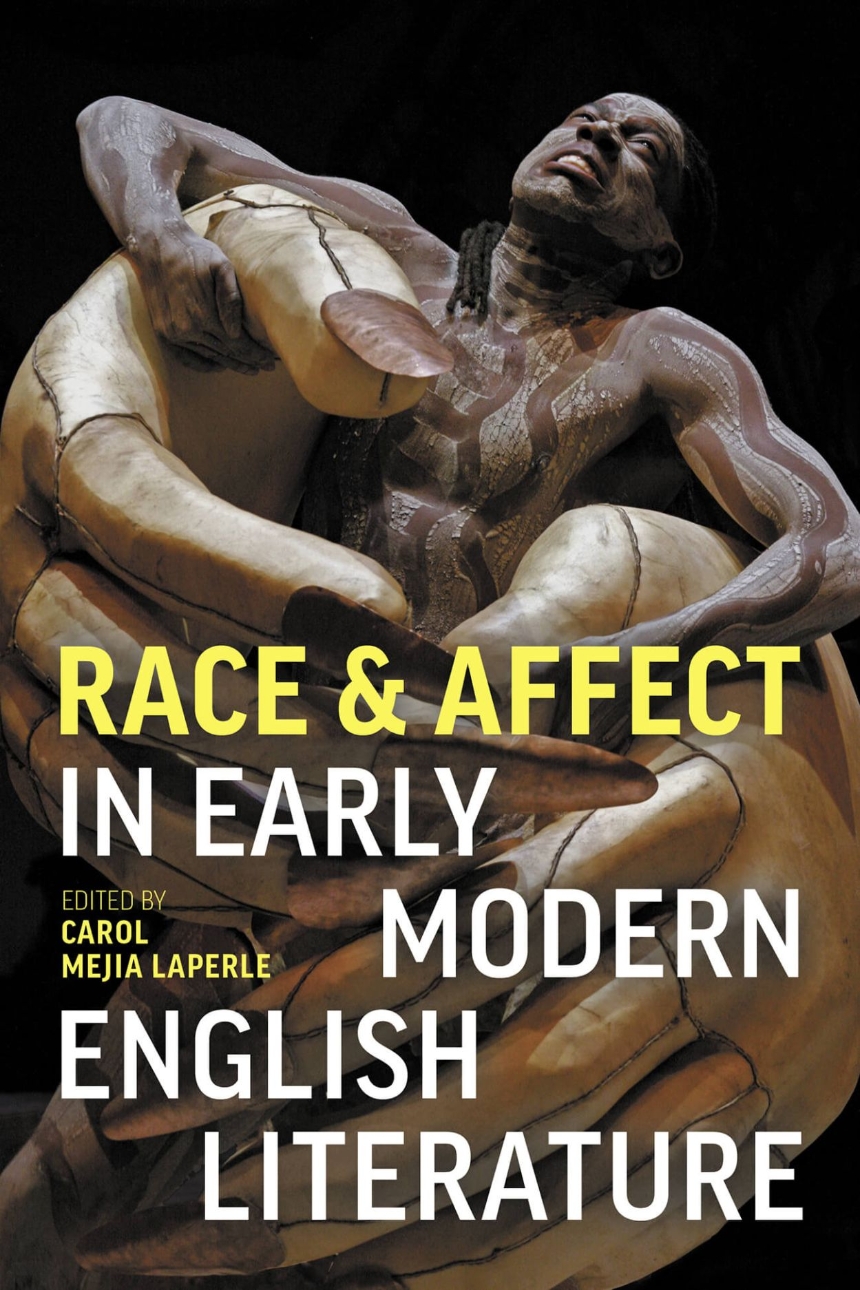Distributed for ACMRS Press
Race and Affect in Early Modern English Literature
This collection brings together critical race studies and affect theory to examine the emotional dimensions of race in early modern literature.
Race and Affect in Early Modern English Literature puts the fields of critical race studies and affect theory into dialogue. Doing so opens a new set of questions: What are the emotional experiences of racial formation and racist ideologies? How do feelings—through the physical senses, emotional passions, or sexual encounters—come to signify race? What is the affective register of anti-blackness that pervades canonical literature? How can these visceral forms of racism be resisted in discourse and in practice? By investigating how race feels, this book offers new ways of reading and interpreting literary traditions, religious differences, gendered experiences, class hierarchies, sexuality, and social identities. So far scholars have shaped the discussion of race in the early modern period by focusing on topics such as genealogy, language, economics, religion, skin color, and ethnicity. This book, however, offers something new: it considers racializing processes as visceral, affective experiences.
Race and Affect in Early Modern English Literature puts the fields of critical race studies and affect theory into dialogue. Doing so opens a new set of questions: What are the emotional experiences of racial formation and racist ideologies? How do feelings—through the physical senses, emotional passions, or sexual encounters—come to signify race? What is the affective register of anti-blackness that pervades canonical literature? How can these visceral forms of racism be resisted in discourse and in practice? By investigating how race feels, this book offers new ways of reading and interpreting literary traditions, religious differences, gendered experiences, class hierarchies, sexuality, and social identities. So far scholars have shaped the discussion of race in the early modern period by focusing on topics such as genealogy, language, economics, religion, skin color, and ethnicity. This book, however, offers something new: it considers racializing processes as visceral, affective experiences.
180 pages | 7 halftones | 6 x 9 | © 2021
Culture Studies:
Literature and Literary Criticism: General Criticism and Critical Theory
Reviews
Table of Contents
Foreword
Margo Hendricks
Introduction
Carol Mejia LaPerle
Section 1: Racial Formations of Affective Communities
Imagining Islamicate Worlds: Race and Affect in the Contact Zone
Ambereen Dadabhoy
Desire, Disgust, and the Perils of Strange Queenship in Edmund Spenser’s The Faerie Queene
Mira Assaf Kafantaris
New World Encounters and the Racial Limits of Friendship in Early Quaker Life Writing
Meghan E. Hall
Early Modern Affect Theory, Racialized Aversion, and the Strange Case of Foetor Judaicus
Drew Daniel
Section 2: Racialized Affects of Sex and Gender
Conversion Interrupted: Shame and the Demarcation of Jewish Women’s Difference in The Merchant of Venice
Sara Coodin
Navigating a Kiss in the Racialized Geopolitical Landscape of Heywood’s The Fair Maid of the West
Kirsten N. Mendoza
Branded with Baseness: Bastardy and Race in King Lear
Mario DiGangi
Section 3: Feelings and Forms of Anti-Blackness
Black Ink, White Feelings: Early Modern Print Technology and Anti-Black Racism
Averyl Dietering
“Away, you Ethiope”: A Midsummer Night’s Dream and the Denial of Black Affect—
A Song to Underscore the Burning of Police Stations
Matthieu Chapman
Othello’s Unfortunate Happiness
Cora Fox
The Racialized Affects of Ill-will in the Dark Lady Sonnets
Carol Mejia LaPerle
Margo Hendricks
Introduction
Carol Mejia LaPerle
Section 1: Racial Formations of Affective Communities
Imagining Islamicate Worlds: Race and Affect in the Contact Zone
Ambereen Dadabhoy
Desire, Disgust, and the Perils of Strange Queenship in Edmund Spenser’s The Faerie Queene
Mira Assaf Kafantaris
New World Encounters and the Racial Limits of Friendship in Early Quaker Life Writing
Meghan E. Hall
Early Modern Affect Theory, Racialized Aversion, and the Strange Case of Foetor Judaicus
Drew Daniel
Section 2: Racialized Affects of Sex and Gender
Conversion Interrupted: Shame and the Demarcation of Jewish Women’s Difference in The Merchant of Venice
Sara Coodin
Navigating a Kiss in the Racialized Geopolitical Landscape of Heywood’s The Fair Maid of the West
Kirsten N. Mendoza
Branded with Baseness: Bastardy and Race in King Lear
Mario DiGangi
Section 3: Feelings and Forms of Anti-Blackness
Black Ink, White Feelings: Early Modern Print Technology and Anti-Black Racism
Averyl Dietering
“Away, you Ethiope”: A Midsummer Night’s Dream and the Denial of Black Affect—
A Song to Underscore the Burning of Police Stations
Matthieu Chapman
Othello’s Unfortunate Happiness
Cora Fox
The Racialized Affects of Ill-will in the Dark Lady Sonnets
Carol Mejia LaPerle

